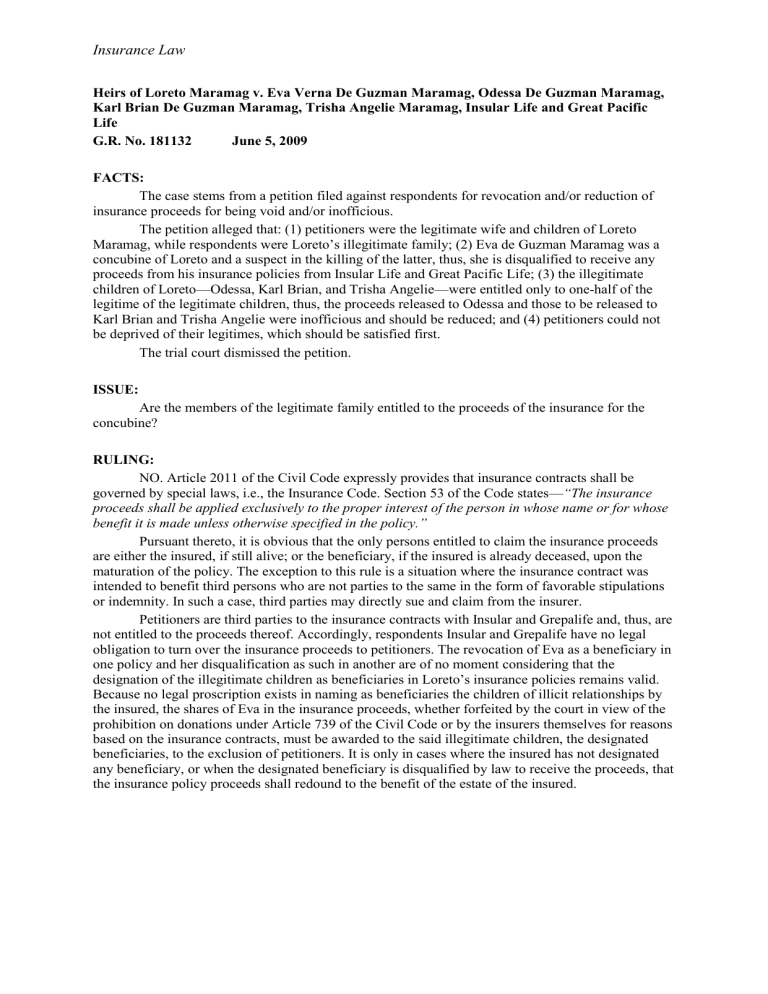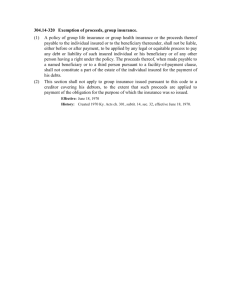
Insurance Law Heirs of Loreto Maramag v. Eva Verna De Guzman Maramag, Odessa De Guzman Maramag, Karl Brian De Guzman Maramag, Trisha Angelie Maramag, Insular Life and Great Pacific Life G.R. No. 181132 June 5, 2009 FACTS: The case stems from a petition filed against respondents for revocation and/or reduction of insurance proceeds for being void and/or inofficious. The petition alleged that: (1) petitioners were the legitimate wife and children of Loreto Maramag, while respondents were Loreto’s illegitimate family; (2) Eva de Guzman Maramag was a concubine of Loreto and a suspect in the killing of the latter, thus, she is disqualified to receive any proceeds from his insurance policies from Insular Life and Great Pacific Life; (3) the illegitimate children of Loreto—Odessa, Karl Brian, and Trisha Angelie—were entitled only to one-half of the legitime of the legitimate children, thus, the proceeds released to Odessa and those to be released to Karl Brian and Trisha Angelie were inofficious and should be reduced; and (4) petitioners could not be deprived of their legitimes, which should be satisfied first. The trial court dismissed the petition. ISSUE: Are the members of the legitimate family entitled to the proceeds of the insurance for the concubine? RULING: NO. Article 2011 of the Civil Code expressly provides that insurance contracts shall be governed by special laws, i.e., the Insurance Code. Section 53 of the Code states—“The insurance proceeds shall be applied exclusively to the proper interest of the person in whose name or for whose benefit it is made unless otherwise specified in the policy.” Pursuant thereto, it is obvious that the only persons entitled to claim the insurance proceeds are either the insured, if still alive; or the beneficiary, if the insured is already deceased, upon the maturation of the policy. The exception to this rule is a situation where the insurance contract was intended to benefit third persons who are not parties to the same in the form of favorable stipulations or indemnity. In such a case, third parties may directly sue and claim from the insurer. Petitioners are third parties to the insurance contracts with Insular and Grepalife and, thus, are not entitled to the proceeds thereof. Accordingly, respondents Insular and Grepalife have no legal obligation to turn over the insurance proceeds to petitioners. The revocation of Eva as a beneficiary in one policy and her disqualification as such in another are of no moment considering that the designation of the illegitimate children as beneficiaries in Loreto’s insurance policies remains valid. Because no legal proscription exists in naming as beneficiaries the children of illicit relationships by the insured, the shares of Eva in the insurance proceeds, whether forfeited by the court in view of the prohibition on donations under Article 739 of the Civil Code or by the insurers themselves for reasons based on the insurance contracts, must be awarded to the said illegitimate children, the designated beneficiaries, to the exclusion of petitioners. It is only in cases where the insured has not designated any beneficiary, or when the designated beneficiary is disqualified by law to receive the proceeds, that the insurance policy proceeds shall redound to the benefit of the estate of the insured.
